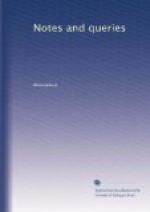“Lord! what a doleful place is this!
There’s neither coal
nor candle;
And nothing I but fishes’ tripes
And greasy guts do bandle.”
I think it a shame that the Maitland Club of Glasgow has not, ere now, volunteered an edition of Zachary’s immortal performance. The Senatus would hardly object (if the expense were undertaken), as the circulation would be confined to true Scots.
PHILOBODIUS.
[The following communication
from a very competent authority,
and the very passage quoted
by “PHILOBODIUS” himself, quite
justify the non-publication
of Zachary’s doggrel.]
Zachary Boyd (No. 19. p. 298.).—Your notice of Zachary Boyd, and his extraordinary paraphrase of the Bible in the College at Glasgow, has reminded me of my having examined that strange work, and found ample cause for its not being published, though a sufficient sum was bequeathed for that purpose. The whole doggrel is only calculated to bring ridicule and contempt upon the Scriptures; but there are, besides, passages such as refer to Job’s “Curse God, and die;” to Jeshuram waxing fat; to Jonah in the whale’s belly; and other parts, which utterly unfit the MS. for decent perusal.
W. JERDAN.
Welsh Ambassador.—The origin of the word “Welsh,” from the Saxon “Wealh,” a stranger, and the use of it in this sense by our old writers (see Brady’s Introd., p. 5.: Sir T. Smith’s Commonwealth of England, chap. xiii.), sufficiently explain this designation of the Cuckoo, the temporary resident of our cold climate, and the ambassador extraordinary in the revolutions of the seasons, in the words of the Nursery Rhymes,—
“She comes as a stranger, and stays three months in the year.”
“Quid tibi vis aliud dicam? me vox mea prodit.”
Alciati, Emblema lx. Cuculi, Comment.
T.J.
Prince Madoc.—I was much gratified on reading “T.T.’s” note, commenting on my observations respecting the Mandan language, as he proves the existence of Celtic words amongst the American Indians. Regarding “T.T.’s” doubts as to the Mandans being descended from the followers of Madoc, I confess that my opinions on the point do not differ very widely from his own. The circumstances attending Madoc’s emigration, in the paucity of its numbers and the entire separation from the mother country, with the character of the Indians, would almost ensure the ultimate destruction of the settlement, or the ultimate absorption of its remains by those who might have had friendly relations with the Welsh. In this most favourable view, the evidences of the presence of the Welsh seven centuries since would be few indeed at the present day. The most striking circumstance of this nature that I met with in Mr. Catlin’s work, is a description of what he calls a “bull-boat,” from its being covered with a bull’s hide, which, in




